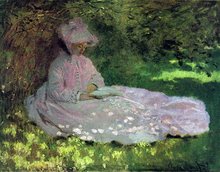 Satire
Satire: A literary work in which human vice or folly is attacked through irony, derision, or wit.
My oldest nephew hates Jane Austen novels, reasoning that all Jane Austen writes about is the frivolous behaviors of pre-Victorian England. What I can’t make him understand (I don’t know where he gets his stubbornness from – probably his mom☺) is that Jane Austen uses her novels to attack such behaviors. Jane Austen’s heroines are usually stronger than such behaviors, Elizabeth Bennet, Anne Elliot, Elinor Dashwood, to name a few.
Northanger Abbey is not one of my favorite Jane Austen’s books, but I think it is her most satirical work – and one of her earliest.
Northanger Abbey was written by Austen in 1798, revised for the press in 1803, and sold in the same year for £10 to a London bookseller, Crosby & Co., who after allowing it to remain for many years on his shelves, was content to sell it back to the novelist's brother, Henry Austen, for the exact sum that he had paid for it at the beginning, not knowing that the writer was already the author of four popular novels. The novel was further revised before being brought out posthumously in late December 1817 (1818 given on the title-page). I find it an interesting satire. (from Wikipedia)Jane Austen herself was only in her early 20’s, and Catherine Morland is 17 (Austen’s youngest heroine). Although Catherine is the heroine, I think the character that best “attacks” feminine foibles is Isabella Thorpe – she really annoyed me to no end. Isabella always spoke in hyperbole (pun intended), and would then do the opposite of what she had previously said:
“…she was so far from seeking to attract [two young gentlemen’s] notice, that she looked back at them only three times.”
Speaking to James Morland: “I would not stand up without your dear sister for all the world,” and then not “three minutes longer” she said to Catherine: “My dear creature, I am afraid I must leave you, your brother is so amazingly impatient…”
To James: “Mr. Morland… I shall not speak another word to you the rest of the evening.” Then, “Isabella smiled incredulously and talked the rest of the evening to James.”
I really like the Masterpiece Theater production of
Northanger Abbey. Less of Isabella and more of a Love story between Henry Tilney and Catherine Moreland, as opposed to the less romantic reasoning in the book: “I must confess that his affection originated in nothing better than gratitude, or, in other words, that a persuasion of her partiality for him had been the only cause of giving her a serious thought.” How romantic.
“The person, be it gentleman or lady, who has not pleasure in a good novel, must be intolerably stupid.”

